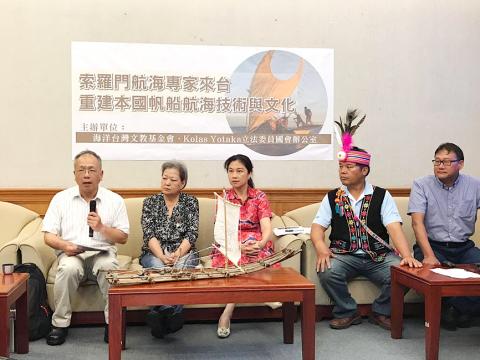Aborigines should revive the art of making sailboats to recover their connection with Austronesian people worldwide, Democratic Progressive Party Legislator Kolas Yotaka and Aboriginal culture advocates said yesterday.
At a news conference at the Legislative Yuan in Taipei, Kolas said when she visited Maori in New Zealand and told them she came from Taiwan, they often responded: “That is where our ancestors came from.”
“In our school textbooks we were always told to look to China, but we have never looked to the east and the Pacific Ocean,” she said.

Photo: Peng Wan-hsin, Taipei Times
Council For Farangaw Autonomy chairman Raranges Hoki Na Tungaw (羅福慶) said his organization has been trying to revive the Aboriginal art of making sailboats, what the Amis call fayan.
A fayan is a boat made of bamboo poles and a triangular or rectangular sail, he said.
His elders used to cross the “black tides” between Taiwan and Green Island (綠島) on this type of boat, he said.
Raranges said the council successfully reproduced a traditional sailboat in 2014 for the first time since the tradition died out and it now hopes the art can be handed down to the younger generation.
“Our culture has been withering, which makes us feel very insecure and anxious,” he said, adding that reproducing the sailboat would be one way to revive Aborigines’ adventurous spirit that connects them to the ocean.
Foundation of Ocean Taiwan chief executive officer Liu Chiung-hsi (劉炯錫) said his organization plans to visit Aboriginal elders in the east to collect more knowledge and stories about making boats.
The foundation would invite elders of the Taumako on the Solomon Islands to exchange their sailing knowledge with Taiwanese Aborigines next month or in September, he said, adding that the foundation also plans to sail its boats to Okinawa, Japan, next year.
“Sailing is the instinct of Austronesian Aborigines,” National Cheng Kung University Institute of Archeology director Liu Yi-chang (劉益昌) said.
“The ocean is not a barrier, but a pathway,” Liu said.

Alain Robert, known as the "French Spider-Man," praised Alex Honnold as exceptionally well-prepared after the US climber completed a free solo ascent of Taipei 101 yesterday. Robert said Honnold's ascent of the 508m-tall skyscraper in just more than one-and-a-half hours without using safety ropes or equipment was a remarkable achievement. "This is my life," he said in an interview conducted in French, adding that he liked the feeling of being "on the edge of danger." The 63-year-old Frenchman climbed Taipei 101 using ropes in December 2004, taking about four hours to reach the top. On a one-to-10 scale of difficulty, Robert said Taipei 101

Nipah virus infection is to be officially listed as a category 5 notifiable infectious disease in Taiwan in March, while clinical treatment guidelines are being formulated, the Centers for Disease Control (CDC) said yesterday. With Nipah infections being reported in other countries and considering its relatively high fatality rate, the centers on Jan. 16 announced that it would be listed as a notifiable infectious disease to bolster the nation’s systematic early warning system and increase public awareness, the CDC said. Bangladesh reported four fatal cases last year in separate districts, with three linked to raw date palm sap consumption, CDC Epidemic Intelligence

Two Taiwanese prosecutors were questioned by Chinese security personnel at their hotel during a trip to China’s Henan Province this month, the Mainland Affairs Council (MAC) said yesterday. The officers had personal information on the prosecutors, including “when they were assigned to their posts, their work locations and job titles,” MAC Deputy Minister and spokesman Liang Wen-chieh (梁文傑) said. On top of asking about their agencies and positions, the officers also questioned the prosecutors about the Cross-Strait Joint Crime-Fighting and Judicial Mutual Assistance Agreement, a pact that serves as the framework for Taiwan-China cooperation on combating crime and providing judicial assistance, Liang

US climber Alex Honnold left Taiwan this morning a day after completing a free-solo ascent of Taipei 101, a feat that drew cheers from onlookers and gained widespread international attention. Honnold yesterday scaled the 101-story skyscraper without a rope or safety harness. The climb — the highest urban free-solo ascent ever attempted — took just more than 90 minutes and was streamed live on Netflix. It was covered by major international news outlets including CNN, the New York Times, the Guardian and the Wall Street Journal. As Honnold prepared to leave Taiwan today, he attracted a crowd when he and his wife, Sanni,